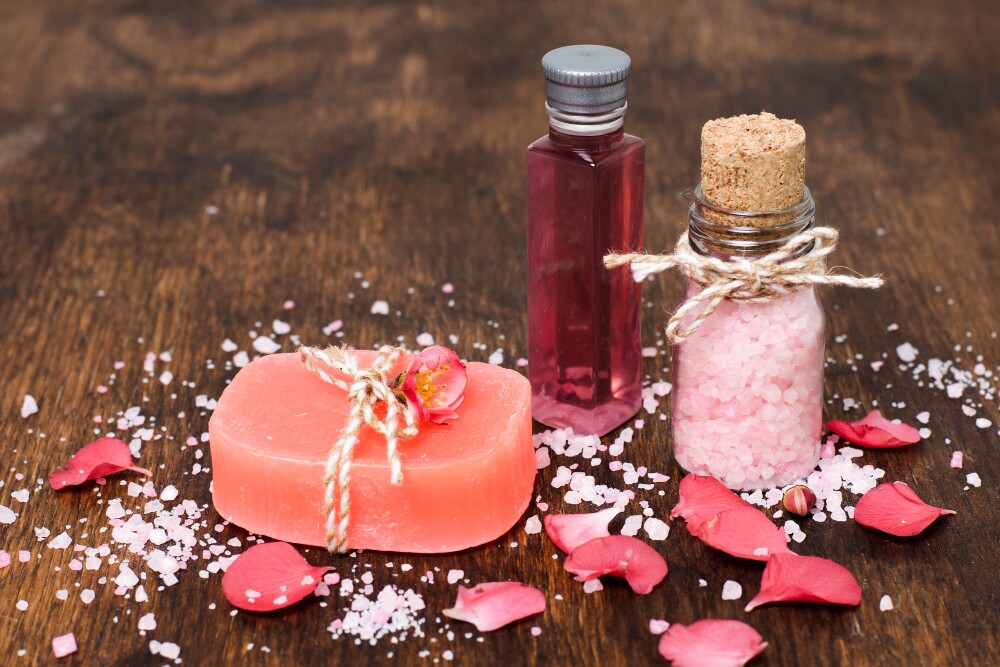Organic Rose Water For Face

In a world teeming with complex skincare solutions, there exists a timeless, natural gem – organic rose water. This fragrant liquid, derived from the petals of meticulously cultivated roses, has earned its place as a skincare staple across centuries and cultures. Its versatility, gentle nature, and abundance of benefits make it a precious addition to any beauty routine.
The Origins and Allure of Organic Rose Water
The use of rose water for beauty purposes dates back to ancient civilizations. Cleopatra, the legendary Egyptian queen, is rumored to have bathed in rose water to enhance her beauty. Persians and Greeks utilized it for its medicinal properties, and it has played a significant role in Middle Eastern and Indian skincare traditions.
Organic rose water signifies a step beyond its traditional counterpart. The roses used in its production are grown without synthetic pesticides, herbicides, or fertilizers. This meticulous process ensures a pure, unadulterated product, maximizing its benefits for the skin. The exquisite fragrance of organic rose water, reminiscent of a blooming rose garden, adds an element of sensory pleasure to its skincare benefits.
A Treasure Trove of Benefits
Organic rose water’s popularity as a skincare ingredient stems from its remarkable list of merits:
- Hydration and Toning: Rose water possesses natural humectant properties, attracting and retaining moisture in the skin. It acts as a gentle toner, removing excess oil and impurities, leaving your skin feeling refreshed and balanced.
- Anti-inflammatory and Soothing: The anti-inflammatory components within rose water calm and soothe irritated skin. It is an excellent remedy for sunburn, redness, or post-treatment sensitivity.
- Antioxidant Protection: Rich in antioxidants, rose water combats free radical damage, which causes premature aging. These antioxidants promote cell regeneration and protect your skin against environmental stressors.
- Antibacterial Properties: Rose water has mild antibacterial properties, making it helpful in fighting acne-causing bacteria. Its ability to balance the skin’s pH also helps prevent breakouts.
- Enhancing Radiance: Rose water revitalizes tired-looking skin, imparting a luminous, dewy glow. It promotes blood circulation, giving your skin a healthy, youthful appearance.
- Mature Skin Support: As we age, our skin’s natural moisture and elasticity decline. Rose water can help hydrate mature skin, reducing the appearance of fine lines and wrinkles, leading to a more supple complexion.
Choosing the Right Organic Rose Water
To reap the full benefits of organic rose water, here’s what to look for when selecting a product:
- Certification: Choose an organic rose water with reputable organic certification (like USDA Organic). This guarantees that the roses were grown and the product was manufactured according to strict organic standards.
- Ingredients: The ingredient list should be short and simple. Ideally, the only ingredient should be “Rosa Damascena (Rose) Flower Water.” Opt for products without alcohol, fragrances, or other unnecessary additives.
- Source: The source of the roses is important. Bulgarian Rosa Damascena roses are particularly prized for their rich, complex fragrance and high concentration of beneficial compounds.
- Packaging: Choose rose water in an opaque or dark-colored glass bottle to protect it from light, which can degrade its quality over time.
Different Ways to Use Organic Rose Water
The beauty of rose water lies in its versatility. Here are a few ways to incorporate it into your skincare routine:
- Toner: After cleansing, mist rose water onto your face or apply it with a cotton pad. It removes last traces of cleanser, balances your skin’s pH, and preps it for serums and moisturizers.
- Facial Mist: Keep a bottle of organic rose water in your bag or on your desk for a refreshing, hydrating boost throughout the day. Especially beneficial in hot weather or air-conditioned environments.
- DIY Face Masks: Combine rose water with other natural ingredients like honey, yogurt, or clay to create simple yet effective face masks.
- Makeup Setting Spray: After applying makeup, a light mist of rose water can help set your makeup and give your skin a dewy finish.
- Hair Rinse: Diluted rose water can be used as a final hair rinse after washing to add shine, reduce frizz, and leave a delicate fragrance.
- Aromatherapy: The soothing scent of rose water can be used for aromatherapy purposes to promote relaxation and reduce stress.
DIY Rose Water Creations
While purchasing reputable organic rose water is highly convenient, there’s something uniquely satisfying about crafting your own at home. Here are a couple of simple methods:
1. Distillation Method
- Materials:
- A large pot with a lid
- A heat-resistant bowl
- A brick or upside-down glass
- Fresh organic rose petals (ideally pesticide-free, fragrant roses)
- Ice
- A clean glass bottle for storing your rose water
- Instructions:
- Thoroughly rinse the rose petals to remove any dirt or debris.
- Place the bowl in the center of the pot and put the brick or upside-down glass inside the bowl.
- Add the rose petals to the pot, surrounding the bowl. Fill with enough water to cover the petals slightly.
- Invert the lid on the pot so the handle points downward into the center of the bowl.
- Turn on low heat. As the water simmers, steam will rise, condense on the lid, and drip into the bowl.
- Place ice on top of the lid to enhance condensation.
- Once a decent amount of rose water has collected in the bowl, turn off the heat and carefully remove the lid.
- Pour the collected rose water into your clean bottle. Store in the refrigerator for freshness.
2. Infusion Method * Materials: * Fresh organic rose petals * Distilled water * A clean glass jar
- Instructions:
- Rinse the rose petals and place them in the jar.
- Fill the jar with distilled water, ensuring the petals are completely submerged.
- Seal the jar tightly and leave it in a sunny spot for several hours or days. The longer the infusion, the more potent your rose water will be.
- Strain the rose water into a clean bottle and store it in the refrigerator.
Environmental Impact and Sustainability
While organic rose water is a natural and beneficial choice, it’s essential to be mindful of its environmental impact. Rose cultivation can be water-intensive, and conventional rose farming often relies on harmful pesticides and fertilizers. Here’s how to support sustainable practices:
- Source Matters: Opt for organic rose water derived from sustainably grown roses. Look for certifications like “Rainforest Alliance” or “Fair Trade” to support ethical and environmentally responsible farming.
- Reduced Packaging: Choose brands that use minimal and recyclable packaging, such as large-format glass bottles that can be refilled or repurposed.
- DIY: If you have access to organic, pesticide-free roses, making your own rose water can minimize waste and ensure control over the ingredients.
Additional Tips and Considerations
Below are some tips and factors to keep in mind when using organic rose water:
- Patch Test: Before incorporating rose water into your routine, perform a patch test on a small area of your inner arm to ensure you don’t have any sensitivities.
- Storage: Store your organic rose water in a cool, dark place to preserve its potency. Refrigeration can help prolong its shelf life.
- Skin Type: Organic rose water is generally suitable for all skin types, but particularly beneficial for dry, sensitive, and mature skin. However, if you have particularly oily skin, use it in moderation to avoid over-hydration.
- Frequency: You can use rose water multiple times a day as a toner or facial mist. Listen to your skin’s needs and adjust frequency accordingly.
- Synergies: Rose water pairs beautifully with other natural skincare ingredients. Consider combining it with aloe vera gel for added hydration, a few drops of essential oils for specific benefits (e.g., lavender for relaxation, tea tree for acne), or hyaluronic acid for deeper moisture penetration.
Potential Limitations and Alternatives
While incredibly beneficial, it’s important to acknowledge that organic rose water won’t be a miracle cure for every skin issue:
- Severe Conditions: If you have severe acne, rosacea, or eczema, rose water should be used as a supplement to your prescribed treatments, not as a replacement.
- Allergies: While rare, some individuals may be allergic to roses. If you experience any irritation or rash, discontinue use immediately.
Alternatives to Rose Water
If your skin is overly sensitive to rose water, or you want to explore other options, consider these similar hydrosols:
- Chamomile Water: Known for its calming and anti-inflammatory properties, chamomile water is great for soothing redness and irritation.
- Lavender Water: Lavender water boasts antiseptic and calming properties, making it helpful for acne-prone skin and relaxation.
- Orange Blossom Water (Neroli): With its uplifting scent and balancing benefits, orange blossom water helps combat excess oil and brighten the complexion.
Embracing the Essence of Nature
Organic rose water exemplifies the power and simplicity of natural skincare. Its gentle touch, refreshing fragrance, and myriad benefits make it a timeless treasure. While modern skincare has its place, integrating pure, organic elements like rose water brings us closer to the healing essence of nature. By including this gem in your skincare ritual, you invite not only radiance, but a sense of tranquility and connection to the wonders of the natural world.












